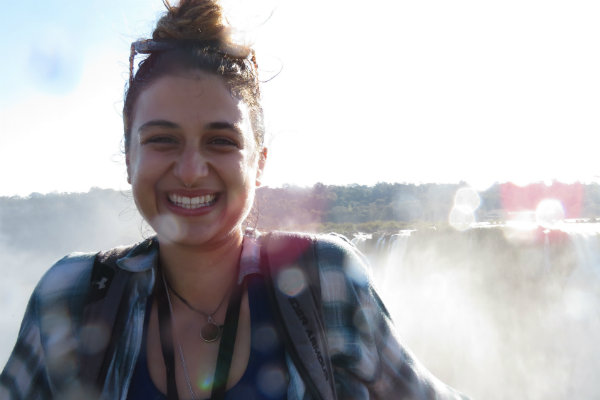Connecting—and Disconnecting—in the Wild
Madeleine Andrews, C’18, conducts animal behavior research locally and globally.
Spotting an owl monkey in the wild takes a lot of patience—and a little bit of luck. Madeleine Andrews, C’18, counts her first glimpse of one of these elusive, wide-eyed, 3-pound primates as one of the most exciting moments of her life.
Andrews, who recently graduated with her bachelor’s degree in biology with a concentration in ecology and evolutionary biology, spent two months last summer in the Argentinian rainforest, where she worked as a research intern with the Owl Monkey Project in the province of Formosa. She and her fellow researchers left their camps before sunrise to catch their nocturnal subjects in action and track their social, vocal, and foraging behaviors. Her second day in the field, peering high into the treetops through shadows and raindrops, she spied a monkey’s fleeting silhouette. Within 10 seconds, it was gone.
“You assume that if you’ve been to the zoo or studied an animal a lot, you know what it feels like to see them. But that doesn’t really prepare you for how breathtaking it is to see a wild animal in its natural habitat,” Andrews says. “It was remarkable just how poignant that moment was.”
Studying owl monkeys drew Andrews to Argentina, but she felt gratified even on days without a single sighting. She enjoyed living “off the grid” among more abundant—but still awe-inspiring—creatures like capybaras, caimans, peccaries (a mammal that resembles a pig), and countless types of colorful birds.
“Like most people, I’m usually attached to my phone, but there I only had internet access on weekends. I didn’t think I needed or wanted an opportunity to disconnect like that, but I did,” she says.
When her internship concluded, Andrews returned home to Philadelphia—for one day. She then boarded a plane to Punta Santiago, Puerto Rico, to begin a six-week independent research project involving a different primate, the rhesus macaque. Research has shown that early life adversity, such as abuse and neglect, impedes the ability to manage stress in adulthood for both people and animals. To examine this phenomenon, Andrews collected saliva from rhesus macaques who had been mistreated by their mothers in infancy and prepped the samples for analysis, as elements of saliva can correlate to stress response.
Securing saliva from monkeys is easier than it sounds, Andrews notes, because they have a sweet tooth. Her daily routine involved applying a layer of powdered, fruit-flavored drink mix to a rope that she had secured to a cotton swab. The rhesus macaques would chew on her hand-sewn devices, leaving traces of saliva behind for her to retrieve.
Two days after her project in Puerto Rico ended, Andrews was back in class, kicking off her senior year.
“This was maybe not the best planning,” she says, underscoring the challenge of re-acclimating to life on a bustling university campus immediately following months of working outdoors with limited social interaction. “But I was lucky to have the opportunity to do field research in two different sites, and having those formative experiences was worth the hard transition back.”
At Penn, Andrews continued her research in the lab of Erol Ackay, Assistant Professor of Biology, where since 2016 she had been studying how social competence—an individual’s ability to adjust its behavior when given an environmental or social cue—can evolve in animals over time.
“It’s like if a kid wants to go get ice cream—he knows to ask his mom when she’s in a good mood, because he’s more likely to get what he wants,” she says. “This is a broad concept that applies to animals, too. We looked at how certain behaviors result in benefits while other behaviors result in costs and studied how these benefits and costs can affect behavior changes in different populations.”
A newly minted graduate, Andrews is still pondering her next steps. For now, she is happy to be living with her family in the Chestnut Hill section of Philadelphia, where she relishes the company of three cats and especially two golden retrievers.
“Studying monkeys was awesome, but dogs are my favorite,” she says. “When working with wild animals, if you’re doing a good job, they shouldn’t be paying attention to you at all. But when you’re with dogs, you can be a little selfish because you get something social out of it. They’re always going to love you back.”



